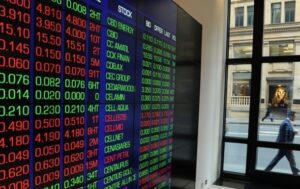
European stock markets continue to decline on Wednesday for the sixth session in a row on investor anxiety due to further economic growth and rising interest rates in the world.
Traders are waiting for the publication of data on changes in US consumer prices in September, which may indicate how effective the tightening policy of the US Federal Reserve System (FRS) is. The report of the Ministry of Labor of the country will be published on Thursday at 15:30 square meters. Analysts expect U.S. inflation to slow to 8.1% last month from 8.3% in August, according to Trading Economics.
The composite index of the largest enterprises in Europe Stoxx Europe 600 fell by 11:20 qoq by 0.4% to 386.39 points.
The German DAX is losing 0.4%, the French CAC 40 – 0.18%, the British FTSE 100 – 0.1%. The Italian FTSE MIB and the Spanish IBEX 35 are down 1% each.
UK GDP in August fell by 0.3% in monthly terms after rising by 0.1% in July, data from the country’s statistics agency ONS showed. Experts on average expected that the volume of the country’s economy in the month before last would not change compared to July, according to Trading Economics.
In annual terms, UK GDP growth slowed to 2% from 3.1% in July.
Industrial production in the UK fell 1.8% in August from July after falling 1.1% a month earlier, the ONS report also said. At the same time, the volume of production in the manufacturing industry fell by 1.6%, in the mining industry – by 8.2%, and in power generation – by 0.6%.
In annual terms, industrial production in the country in August fell by 5.2% compared with a decline of 3.2% a month earlier.
The UK trade deficit widened to £7.1bn ($7.8bn) last month from £5.4bn in July. Imports rose 4.3% m/m to a record £75.3bn, exports up 2.2% to £68.2bn.
Consumer goods and medical equipment maker Royal Philips NV shed 8.4%. The Dutch company said its third-quarter like-for-like sales were down about 5% due to stronger-than-expected problems in its electronics supply chains.
Among the decline leaders in the Stoxx 600 is also TAG Immobilien AG (-9.3%), which operates in residential real estate.
Meanwhile, LVMH Moet Hennessy Louis Vuitton SA, the world’s largest luxury goods maker, is up 2.2%. The company on Tuesday evening after the close of trading published a statement in which it said that its revenue in the third quarter of 2022 increased by 27%, surpassing market forecasts.
Danish biopharmaceutical company Chr. Hansen Holding AS surged 12.7% after posting strong third-quarter results and a promising full-year outlook.
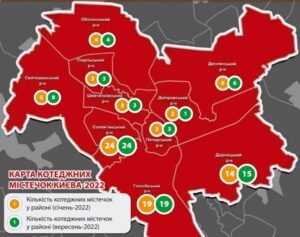
As of October 01, 2022, according to the RealExpo consulting company and the database of the suburban real estate portal www.zagorodna.com, there were 86 townships in Kyiv compared to 84 objects in January.
For the same period in 2021, 16 new projects appeared in Kyiv.
The number of cottage townships in Kyiv,
January-September-2022
(according to www.zagorodna.com)
Kyiv area January September
Goloseevsky 19 19
Darnitsky 14 15
Desnyansky 6 6
Dneprovskiy 2 1
Obolonsky 4 4
Pechersky 3 3
Podolsky 3 3
Svyatoshinsky 6 8
Solomensky 24 24
Shevchenkovskiy 3 3
TOTAL 84 86
According to the director of the RealExpo consulting company and the head of the www.zagorodna.com portal, Viktor Kovalenko, “2 new projects appeared on the cottage construction market in Kyiv during 9 months of 2022: 1 in Goloseevsky and 1 in Darnitsky districts. In the private sector above these areas, new projects have appeared on small plots from 10 to 20 acres. These are townhouses for 4-12 households. The adjacent plots to the townhouses are also small: from 0.7 to 2 acres. The area of households in new projects ranges from 85 to 194 sq.m. This is basically a comfort-class housing.
The first place in terms of the number of townships belongs to the Solomensky district – 24 townships.
The second place in terms of the number of towns is Goloseevsky district (19 towns).
The third place belongs to the Darnytsia region (15 towns).
Types of real estate in cottage townships in Kyiv
in 60 cottage villages the preferred type of real estate is townhouses against 50 in January. The proportion of townhouses is 69.76% of all townships. The leader is Solomensky district (23 projects);
in 2 towns – quadrexes against 2 in January. The proportion of quadrexes is 2.32% of all townships. There is one town with quadrexes each in the Solomensky and Goloseevsky districts;
in 8 towns – duplexes against 6 in January. The share of duplexes is 9.3% of all campuses. The leaders in duplexes are Goloseevsky and Darnitsky districts (2 towns each);
in 27 towns – cottages against 24 in January. The share of cottages is 31.39% of all campuses. The leader is the Darnitsky district (8 towns with cottages);
Types of real estate in cottage townships in Kyiv
(according to www.zagorodna.com ), January-September-2022
Type January September
Quadrex 2 2
Duplex 6 8
Cottage 24 27
Townhouse 50 60
Readiness in cottage townships in Kyiv
The leader in terms of readiness are built towns (65.11%), followed by towns under construction (25.58%) and projects account for 9.3%.
56 cottage villages built compared to 50 in January;
22 campuses under construction compared to 24 at the beginning of the year;
8 projected settlements against 10 in January;
Championship in built towns near the Solomensky district (17 towns).
Championship in towns under construction near Goloseevskogogor district (7 towns).
Goloseevo is ahead in terms of projects (4 campuses).
The degree of readiness in the cottage townships of Kyiv
(according to www.zagorodna.com ), January-September-2022
Status January September
Built 50 56
under construction 24 22
Project 10 8
“Frozen” cottage villages in Kyiv
Currently, construction has been halted in Kyiv at 9 sites: Karpatsky, Bolgarsky project, Townhouses on Trakhtemirovskaya, Nizhnie Sady, Villas on Grabovsky, Cottages on Osokorki, Townhouses on Metrological, Pushcha Residence”, trans. Pine 18-22.
This is 30% of the total number of cottage settlements under construction and projected.
Most of the frozen construction projects are located in the Goloseevsky district (4), 2 projects in the Darnitsky district and 1 construction site each in Desnyansky, Obolonsky and Solomensky districts.
Sold cottage settlements in Kyiv
In 40 cottage villages in Kyiv, construction has been completed and all households in the towns have been sold. This is 46.5% of the existing campuses.
What and where is being built in Kyiv? Cottages and townhouses in cottage towns in Kyiv have an area of 30 sq.m in townhouses “Bulgarian project” and reach 800 sq.m in villas in the “Italian quarter”; located on land plots ranging from 0.06 to 62 hectares and have adjacent plots from 0.1 to 50 acres, designed for 3-295 households.
They are built from gas blocks, bricks with insulation and connected communications.
Expert opinions
We asked developers how the demand in cottage towns has changed since the outbreak of hostilities and how prices have reacted to the war.
Vladimir, project manager of Sosnovy Bor duplexes, commented on the situation on the market of cottage townships in Kyiv:
“Compared to pre-war, the demand for duplexes in our project has fallen by 100%.
Buyers are waiting for the market to crash and prices to fall in order to invest profitably.
There is a lot of pent-up demand. People call and look at real estate. Until the end of the war, they postponed the purchase, but plan to return to this issue later. People are afraid to invest in houses during the war.
Since the beginning of hostilities, building materials have risen in price, and some of them, like glass, aerated concrete, metal of some brands, are in short supply.
Builders are also in short supply. Many went to the front.
In many projects, there will be a delay in the commissioning date of 3-5 months because of this.
The cost of construction in hryvnia increased, while in dollars it remained at the same level.
The cost we have before the war and is now declared in dollars at the exchange rate. The cost in dollars decreased by 10-15%.
The representative of the developer in the Happiness CG, Timofey, said: “in our project, demand fell by 90%. There’s just a lot of pent-up demand. The prices were denominated in dollars. Prices have decreased by 5-10%, but in each case, individual conditions are discussed.”
Sales manager of Montreux Townhouses Alexander reported that “demand in the project fell by 90%. Prices have dropped by 15%.
Andrey, a representative of the builder in OldStories townhouses, said: “In our project, demand fell by 60%. The prices were denominated in dollars. Prices have not changed.
Conclusions:
Demand in cottage townships in Kyiv, according to experts, has decreased by 60-100% since the beginning of the war, but it is gradually resuming.
It was military operations in Kyiv and its environs, “arrivals” that influenced and are still affecting the drop in demand for townhouses and cottages in Kyiv.
Growth or fall in demand depends on the distance from the center, readiness, type of real estate.
Buy and sell cottages and townhouses in Kyiv on the suburban real estate portal zagorodna.com
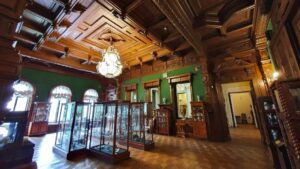
The capital’s museums that suffered from rocket fire are closed until approximately October 16, the liquidation of the consequences is underway, and fundraising for restoration work has been announced.
The Khanenko Museum, in particular, reported that the team was not injured, the collection has been safe since the beginning of Russia’s full-scale invasion of Ukraine.
“The work on assessing the damage is ongoing. You probably saw in numerous photos and videos from the scene that the windows of the museum were damaged. We have already blocked them and removed the broken glass. Thanks to the friends and volunteers of the museum for this!” on Facebook.
For those wishing to help financially, the accounts of the museum’s partners, the Mizhvukhami Fund charitable organization are published:
UA323052990000026001016208973 UAH/840
UA753052990000026001046225528 EUR/978
UA633052990000026006026228830 USD/840
In the appointment it is necessary to indicate “For the Khanenkiv Museum”.
The National Science and Natural Museum of the National Academy of Sciences of Ukraine reported that the windows of the courtyard of the museum in the exposition halls of the geological, paleontological and zoological departments were knocked out by the blast wave.
“We are forced to ask for help. We urgently need materials or funds to purchase materials for the prompt repair of broken windows,” the museum’s page says.
If you can help financially – charitable account of the National Science and Natural Museum:
UA 958201720313271001302009806
Code ЄDRPO19020229
Full name: National Science and Natural Museum of the National Academy of Sciences of Ukraine (abbreviated as NNPM NAS of Ukraine)
If there is an opportunity to help with materials – the phone number of the director for museum and scientific work Chervonenko Oksana Vladimirovna +380503113256.
The windows of the first and second floors were damaged at the Taras Shevchenko National Museum. According to the museum, the process of cleaning and assessing losses is underway. For those who want to help, the account is indicated:
UA 43 820172 0 3132 71001 30101 6007
EDRPOU 022 26 116
The building of the Kyiv Art Gallery (formerly the Museum of Russian Art) was left without a roof and windows due to the raid. Funds for the restoration are collected by the charitable foundation. Sholom Aleichem. Requisites:
EDRPOU code 41378964
p/r UA133052990000026009016711600 in JSC CB “PrivatBank”
Purpose of payment: “A charitable contribution to commemorate the National Museum “Kyiv Art Gallery” of the victim of a violent aggression, head of 10.10.2022.”
The rector of the Taras Shevchenko National University of Kyiv Volodymyr Bugrov called for support for the restoration of the damaged university buildings and published the details:
In Ukraine:
r/r UA188201720313271002301014095
bank code 820172
code ЄDRPOU 02070944
For assistance in foreign currency, accounts are opened in Oschadbank: https://bit.ly/3COMgC0
As reported, during a massive rocket attack on October 10, the buildings of the Taras Shevchenko National University of Kyiv (the Red Building and the building of the Institute of Philology), the Scientific Library named after M. Maksimovych, the Institute of Literature of the National Academy of Sciences of Ukraine, the Institute of Archeography of the National Academy of Sciences of Ukraine, the National Philharmonic, the House of the Central glad, which houses the Pedagogical Museum of Ukraine and the Museum of the Ukrainian Revolution of 1917-1921. Also, the National Museum of Arts named after B. and V. Khanenko, the National Museum of Taras Shevchenko, the Kyiv Art Gallery, the National Research and Restoration Center, the memorial museum-apartments of M. Bazhan and P. Tychyna, the National Science and Natural Museum of the National Academy of Sciences of Ukraine Ukraine, Museum of the history of the city of Kyiv.
https://www.facebook.com/khanenkomuseum/photos/a.10155621344004162/10161146499489162/
https://www.facebook.com/permalink.php?story_fbid=5550628474991631&id=100001335990722
https://www.facebook.com/photo/?fbid=8389957164378847&set=a.289508001090511
The Open4Business project is ready to process and post information about humanitarian requests from organizations in need of restoration free of charge.
Dynamics of changes in discount rate of NBU

NBU , graphics of the Club of Experts
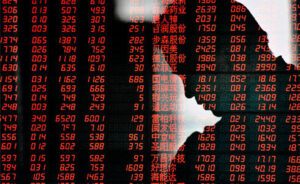
Most of the stock indices of the largest Asian countries are falling on Wednesday.
Markets continue to be negatively affected by the threat of a recession in the global economy against the backdrop of persistently high inflation and tightening of monetary policy by major central banks, writes MarketWatch.
The International Monetary Fund on the eve worsened its forecast for global economic growth next year to 2.7% compared to 2.9% expected in July. At the same time, it is noted that the risks of a recession are especially high for Europe due to a sharp increase in energy prices.
China’s Shanghai Composite index fell 1.1% by 8:32 a.m. The Hong Kong Hang Seng shed 2.1%, falling for the fifth consecutive trading and is at its lowest level in the last 11 years.
Among the leaders of the decline in quotations on the Hong Kong Stock Exchange are securities of the owner of the restaurant chain Haidilao International Holding Ltd. (-7%), Budweiser Brewing Co. APAC Ltd. (-5.9%), casino operator Sands China Ltd. (-5.7%), developer Country Garden Holdings Co. (-5.6%).
Shares of Internet retailers Alibaba Group and JD.com fell 4.5% and 1.1%, respectively, while Internet giant Tencent Holdings Ltd. – by 2.2%, automakers Geely and BYD – by 3.1% and 0.5% respectively.
Among the components of Hang Seng, only three companies show an increase in value: insurer AIA (+0.7%), aluminum producer China Hongqiao Group Ltd. (+0.2%) and pharmaceutical CSPC Pharmaceutical Group Ltd. (+0.1%). Share price of China Mobile Ltd. is at the close of the previous day.
The value of the Japanese Nikkei 225 fell by 0.06% by 8:27 Moscow time.
The volume of orders for basic manufacturing equipment in Japan, an indicator of capital expenditure for the next 3-6 months, fell 5.8% in August compared to the previous month, the country’s cabinet said in a statement. This was the worst result in the last six months. Analysts, on average, had expected a contraction of just 2.3%, according to Trading Economics.
The leaders of the decline in quotations are papers of Tokyo Electron Ltd. (-4%), Pacific Metals Co. (-3.5%) and Mitsubishi Motors Corp. (-3.5%).
Meanwhile, the value of retailers Seven & I Holdings Co. is rising. (+3.7%) and Aeon Co. (+3.5%), as well as railway operators West Japan Railway Co. (+2.8%) and Central Japan Railway Co. (+2.5%).
The Australian S&P/ASX 200 fell 1.5%.
The capitalization of the world’s largest mining companies BHP and Rio Tinto fell by 1% and 1.9%, respectively
Meanwhile, the South Korean Kospi index increased by 0.35% by 8:27 Moscow time.
Quotes of securities of one of the world’s largest manufacturers of chips and electronics Samsung Electronics Co. rise by 0.9%, while the cost of automaker Hyundai Motor fell by 0.3%.
The Bank of Korea on Wednesday raised the base interest rate by 0.5 percentage points – up to 3% per annum, which coincided with the expectations of experts. The cost of lending has been increased for the eighth time since August 2021.
The Central Bank predicts that inflation in the country will peak in October, but will remain quite high in the near future – more than 5%, at least until the end of the first quarter of 2023. South Korea’s GDP is expected to increase by 2.6% in 2022, and by 2.1% next year.
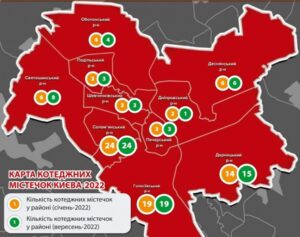
The average price of 1 square meter in the cottage towns of Kyiv as of October 1, 2022, according to the consulting company “RealExpo” and the suburban real estate portal www.zagorodna.com, was UAH 58,489, which is UAH 24,970. more than in January. The price increase in hryvnias since the beginning of the year was 74.49%.
This growth is associated with a 51% increase in the dollar since the beginning of the year, a 50% increase in the cost of construction materials. The real value of a square minus the rising dollar in hryvnias increased by +23.49% over 9 months.
As for the cost in the cottage villages of Kyiv, according to Viktor Kovalenko, the director of the CC “RealExpo” and the head of the portal www.zagorodna.com, “built cottage towns and apartments in new buildings put a lot of pressure on it.”
Average cost in cottage towns of Kyiv,
January-September 2022, UAH/sq.m
(according to www.zagorodna.com)
District of Kyiv January September
Holosiivskyi 43451 76324
Darnytskyi 23356 43747
Desnyanskyi 20440 30688
Dniprovsky 22929
Obolonsky 39854
Pechersky 60300
Podolsky 54411 91039
Svyatoshinsky 28297 46397
Solomianskyi 26550 50392
MIDDLE 33519 58489
The minimum cost of 1 square meter. m – UAH 20,550. in the built townhouses “Pyrogovo” on the street Laureatska, 102 in Holosiivsky district.
The maximum cost of 1 sq.m. m – UAH 150,000. in the ready KM “Konyk” on the street Lyutnev in the Holosiiv district.
The leader in terms of the average cost of a “square” in the cottage villages of Kyiv is Podilsky district (91,039 UAH). The average cost has increased by 67.3% since the beginning of the year; in second place – Holosiivskyi district (76,324 hryvnias). The price per square meter in the district has increased by 75.65% since the beginning of the year; in third place – Solomyansky district (50,392 hryvnias), the average price per square meter has increased by 89.8% since January.
In the Dnipro district, the average cost of a “square” is the lowest in Kyiv – UAH 22,929.
The average price per square meter in the cottage towns of Kyiv varied depending on the type of real estate. As of 01/10/2022, it looked like this:
The cost of types of real estate in cottage towns of Kyiv,
UAH/sq.m, January-September 2022
Property type January September
Duplex 25829 36989
Townhouse 28164 52944
Quadrex 47369 93717
Cottage 41817 64203
“Square” in quadrexes turned out to be the most expensive, since there are only 2 towns with quadrexes, and the price in one of them is very high and affects the average cost.
In second place in terms of cost are cottages (64,203 UAH). Their cost is 21.27% more expensive than a square meter in townhouses. A square meter in townhouses is 43.13% more expensive than in duplexes.
The average price per square meter in the cottage towns of Kyiv varied depending on the state of construction/readiness. As of 01/10/2022, it looked like this:
The average price per square meter in the cottage towns of Kyiv varied depending on the state of construction/readiness. As of 01/10/2022, it looked like this:
under construction – UAH 58,005;
built – UAH 59,835.
The average cost of a “square” in built towns is 3.15% more expensive than in towns under construction.
Conclusions:
The growth of prices in the cottage towns of Kyiv is influenced by:
– lack of solvent demand;
– lack of buyer-investors;
– increase in the dollar rate;
– the increase in the cost of construction materials and the increase in the price of logistics;
– fuel price increase;
– migration processes;
– labor shortage;
– unpredictability of war;
– difficult economic situation and inflation;
– lack of lending to developers;
– destruction of the installment mechanism
The price of a “square” depends on the location: the closer to the center of Kyiv, the more expensive it is; depending on the type of real estate: “square” townhouses are cheaper, cottages are more expensive; from the state of construction: in built towns, the cost of a “square” is higher than in towns under construction.
Buy and sell cottages and townhouses in Kyiv on the suburban real estate portal zagorodna.com
Author: Viktor Kovalenko, director of the RealExpo consulting company